Search -
Beyond the Conspiracy
Beyond the Conspiracy
Author:
The English author and MI6 operative H.G. Wells in his work The Open Conspiracy wrote about the lack of understanding of ?the common man? of secret societies, as did Dr. Jacob Hass, the biographer for the American Justice Brandeiss, who said that secret deals are made about which it is very difficult to obtain definitive information, until they ... more »
Author:
The English author and MI6 operative H.G. Wells in his work The Open Conspiracy wrote about the lack of understanding of ?the common man? of secret societies, as did Dr. Jacob Hass, the biographer for the American Justice Brandeiss, who said that secret deals are made about which it is very difficult to obtain definitive information, until they ... more »
ISBN-13: 9780963401960
ISBN-10: 0963401963
Pages: 226
Rating: ?
ISBN-10: 0963401963
Pages: 226
Rating: ?
0 stars, based on 0 rating
Genres:




